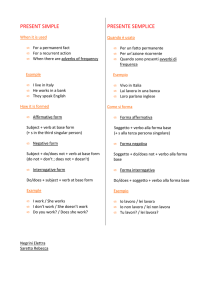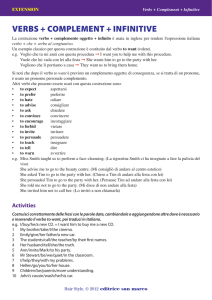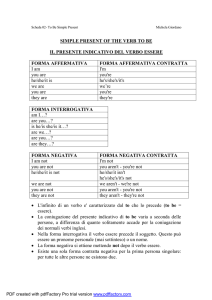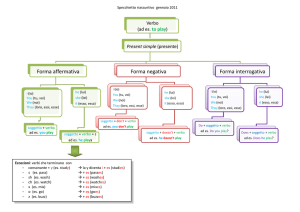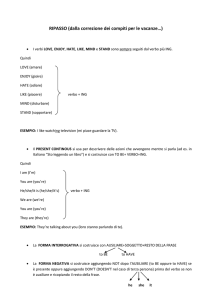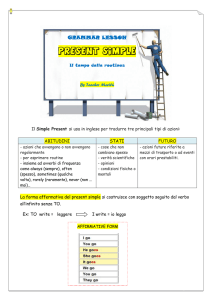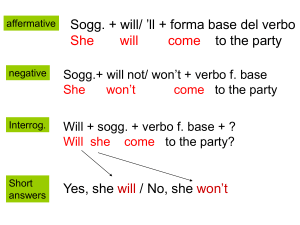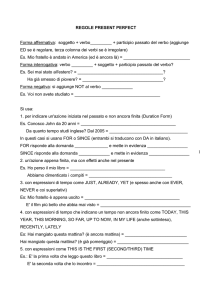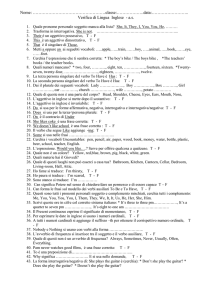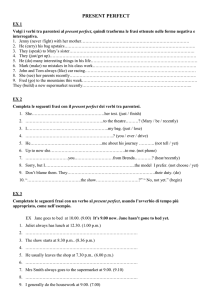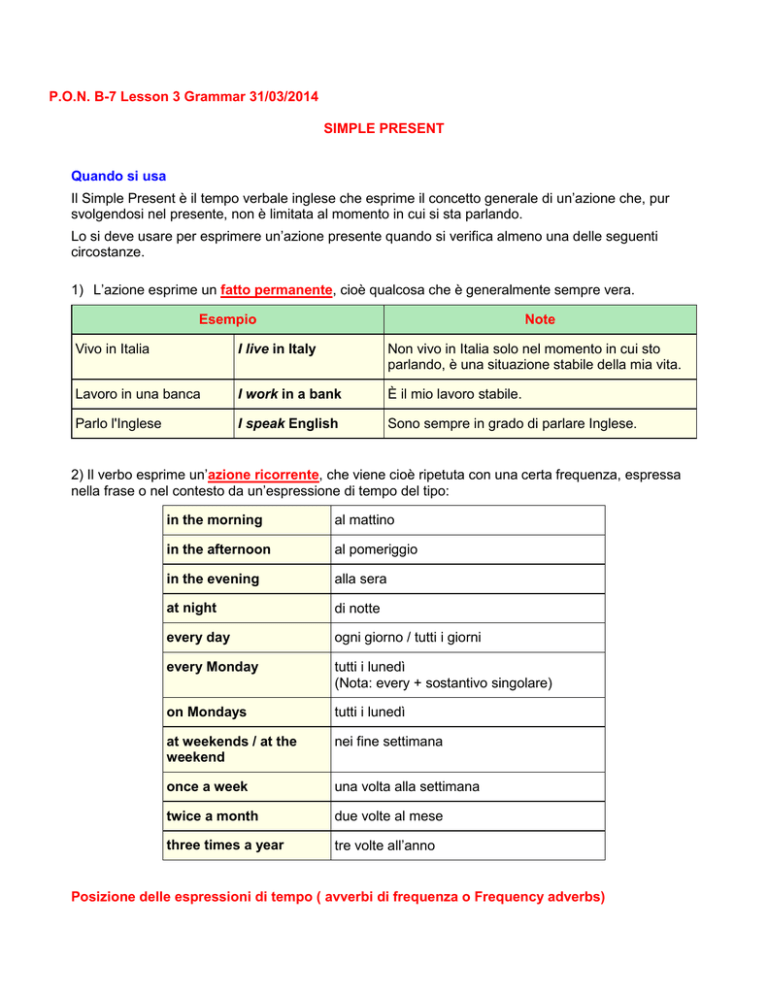
P.O.N. B-7 Lesson 3 Grammar 31/03/2014
SIMPLE PRESENT
Quando si usa
Il Simple Present è il tempo verbale inglese che esprime il concetto generale di un’azione che, pur
svolgendosi nel presente, non è limitata al momento in cui si sta parlando.
Lo si deve usare per esprimere un’azione presente quando si verifica almeno una delle seguenti
circostanze.
1) L’azione esprime un fatto permanente, cioè qualcosa che è generalmente sempre vera.
Esempio
Note
Vivo in Italia
I live in Italy
Non vivo in Italia solo nel momento in cui sto
parlando, è una situazione stabile della mia vita.
Lavoro in una banca
I work in a bank
È il mio lavoro stabile.
Parlo l'Inglese
I speak English
Sono sempre in grado di parlare Inglese.
2) Il verbo esprime un’azione ricorrente, che viene cioè ripetuta con una certa frequenza, espressa
nella frase o nel contesto da un’espressione di tempo del tipo:
in the morning
al mattino
in the afternoon
al pomeriggio
in the evening
alla sera
at night
di notte
every day
ogni giorno / tutti i giorni
every Monday
tutti i lunedì
(Nota: every + sostantivo singolare)
on Mondays
tutti i lunedì
at weekends / at the
weekend
nei fine settimana
once a week
una volta alla settimana
twice a month
due volte al mese
three times a year
tre volte all’anno
Posizione delle espressioni di tempo ( avverbi di frequenza o Frequency adverbs)
In inglese le espressioni di tempo vanno messe all’inizio o alla fine della frase.
Esempio:
Vado al cinema TUTTI I SABATI con i miei amici.
a) ON SATURDAYS I go to the cinema with my friends.
b) I go to the cinema with my friends ON SATURDAYS.
Nelle frasi interrogative e negative vanno messe sempre alla fine della frase.
Esempio:
Do you go to the cinema ON SATURDAYS?
I don’t often go to the cinema ON SATURDAYS.
3. Nella frase al presente c’è un avverbio di frequenza. Gli avverbi di frequenza sono quegli avverbi di
tempo che rispondono alla domanda "quanto spesso?"
I principali avverbi di frequenza inglesi sono:
always
sempre
often
spesso
usually
di solito
sometimes
qualche volta
seldom
ogni tanto
rarely
raramente
hardly ever
quasi mai (vuole sempre il verbo nella forma affermativa)
never
mai (vuole sempre il verbo nella forma affermativa)
ever
mai (nelle frasi interrogative)
Posizione dell'avverbio di frequenza:
Gli avverbi di frequenza vanno messi tra soggetto e verbo.
Es. Mark OFTEN works at home.
Nella forma interrogativa l’avverbio di frequenza rimane tra soggetto e verbo.
Es. Does Mark OFTEN work at home?
Nella forma negativa l’avverbio di frequenza va tra ausiliare e verbo.
Es. Mark doesn’t OFTEN work at home.
Quando il verbo della frase è un ausiliare, l’avverbio di frequenza segue l’ausiliare.
Es. Mark is OFTEN tired. (Il verbo to be è un ausiliare)
4. Si usa il Simple Present per esprimere il presente di alcuni verbi inglesi che non vengono utilizzati al
Present Continuous, anche se si tratta di azioni limitate al momento in cui si parla.
I principali verbi che non vengono utilizzati nei tempi progressivi sono:
To want (volere)
To like (piacere)
I verbi che indicano sentimenti (to love, amare - to hate, odiare ecc…)
I verbi di percezione (to hear, udire - to see, vedere ecc…)
I verbi che indicano attività intellettuale (to know, sapere - to understand, capire ecc…)
I verbi che indicano possesso (to have, avere - to own, possedere)
Perciò se devo dire:
"Voglio un gelato"
non potendo utilizzare il Present Continuous con il verbo to want, devo usare il Simple Present anche se
il gelato lo voglio in questo momento:
"I want an ice-cream"
Come si costruisce
Forma affermativa:
Il Simple present è un tempo semplice, cioè non si avvale di nessun ausiliare nella forma affermativa.
Il soggetto, che va sempre espresso, è seguito dalla forma base del verbo.
(forma base = infinito senza to >>vedi paradigma dei verbi inglesi)
Alla 3° persona singolare si aggiunge una s alla forma base, nelle altre persone il verbo resta invariato.
Forma negativa e interrogativa:
Essendo il Simple Present un tempo semplice, i verbi non-ausiliari hanno bisogno dell’aiuto di un
ausiliare. Si usa il verbo TO DO che perde il suo significato di "fare" e serve solo ad aiutare il verbo della
frase ad assumere la forma interrogativa e negativa.
(Vedi generalità sulle forme interrogative e negative)
Forma
forma
affermativa
Costruzione
SOGGETTO + FORMA BASE
(+ s alla 3° persona sing.)
Esempio
I work
you work
he/she/it works
we work
you work
they work
forma
negativa
SOGGETTO + DO / DOES + NOT I do not work
+ FORMA BASE
(I don’t work)
He does not work
DO NOT = DON'T
(He doesn’t work)
DOES NOT = DOESN'T
forma
interrogativa
DO/DOES+SOGGETTO+FORMA Where do you
BASE
work?
Where does he
work?
Eccezioni alla 3° persona singolare
Poiché l'unica variabile del Simple Present è la terza persona singolare, le uniche eccezioni riguardano
la terza persona singolare.
Regola
Esempio
I verbi che terminano per -ss, -sh, -ch, -x, -o aggiungono to kiss (baciare) >> kisses
-es
to watch (guardare) >>watches
to go (andare) >> goes
to relax (rilassarsi) >> relaxes
I verbi che terminano per -y preceduta da consonante,
cambiano la -y in i e aggiungono -es.
to study (studiare) >> studies
Ciò non accade quando la -y è preceduta da vocale.
I verbi modali (can - may - must) restano invariati
to play (giocare) >> plays
Il verbo to have (avere) diventa has
I have a new car >> He has a new car
I can swim >>He can swim
PRONOMI PERSONALI COMPLEMENTO
Sono pronomi personali che nella frase hanno la funzione di complemento diretto o indiretto*.
• Tu studi con loro.
Tu = Pronome personale soggetto
Loro = Pronome personale complemento
In Italiano ogni pronome personale complemento ha diverse forme.
In Inglese c’è una sola forma per ogni pronome complemento, che deve sempre seguire il verbo:
ITALIANO
Io lo guardo
Io gli parlo
Io parlo con lui
INGLESE
I’m watching him
I’m talking to him
I pronomi personali soggetto e complemento inglesi sono i seguenti:
Pron. Pers.
Soggetto
I
Pron. Pers.
Complemento
Me
You
He
She
It
We
You
They
You
Him
Her
It
Us
You
Them
*NOTA
Complemento diretto: complemento oggetto, non è preceduto da preposizione.
Complemento indiretto: è preceduto da preposizione (con lui)
P.O.N. lesson 3 ESERCIZI 31/03/2014
ESERCIZIO SUL SIMPLE PRESENT BEGINNERS
GB
Complete the passage with the correct form of the SIMPLE PRESENT
1) Hello, I
♥ Hello, I’m Julia.
(to be) Julia.
2) I
(to be) 19 and I
♥ I’m 19 and I live in London.
(to live) in London.
3) I
(not/to go) to school any longer and I
♥ I don’t go to school any longer and I am a singer.
(to be) a singer.
4) I
(to work) in a pub in Regent's Street.
♥ I work in a pub in Regent’s Street.
5) Every night I
(to go) there with my best friend Sarah.
♥ Every night I go there with my best friend Sarah.
6) She
♥ She is 22.
(to be) 22.
7) She
(to live) in London and
♥ She lives in London and has a beautiful flat.
(to have) a beautiful flat.
8) We
(to work) together.
♥ We work together.
9) She
(to play) the guitar and I
♥ She plays the guitar and I sing.
10) We
(to have) a dream. We
♥ We have a dream. We want to become
(to sing).
(to want) to become famous.
2. ESERCIZIO SUL SIMPLE PRESENT BEGINNERS
GB
Make the following sentences both negative and interrogative
1) Gordon plays the guitar.
NEG
INT
♥ Neg: Gordon doesn't play the guitar.
♥ Int: Does Gordon play the guitar?
2) Your cousins live near Victoria station.
NEG
INT
♥ Neg: Your cousins don't live near Victoria station.
♥ Int: Do your cousins live near Victoria station?
3) Their computer works well.
NEG
INT
♥ Neg: Their computer doesn't work well.
♥ Int: Does their computer work well?
4) Julie Andrews is a good actress.
NEG
INT
♥ Neg: Julie Andrews isn't a good actress.
♥ Int: Is Julie Andrews a good actress?
5) Your grandparents drink tea in the afternoon.
NEG
INT
♥ Neg: Your grandparents don't drink tea in the afternoon.
♥ Int: Do your grandparents drink tea in the afternoon?
6) Her father plays tennis on Mondays.
NEG
INT
♥ Neg: Her father doesn't play tennis on Mondays.
♥ Int: Does her father play tennis on Mondays?
7) Their best friend goes to school by bus.
NEG
INT
♥ Neg: Their best friend doesn't go to school by bus.
♥ Int: Does their best friend go to school by bus?
8) Your brother comes to dinner every day.
NEG
INT
♥ Neg: Your brother doesn't come to dinner every day.
♥ Int: Does your brother come to dinner every day?
9) Her son plays the piano.
NEG
INT
♥ Neg: Her son doesn't play the piano.
♥ Int: Does her son play the piano?
10) Mark washes his hair every morning.
NEG
INT
♥ Neg: Mark doesn't wash his hair every morning.
♥ Int: Does Mark wash his hair every morning?
3. ESERCIZIO DI CORREZIONE DI ERRORI BEGINNERS
GB41
1) She is your sister? Yes, she is.
♥ Is she your sister? Yes, she is.
2) What you study at school? I studies English, Maths and History.
♥ What do you study at school? I study English, Maths and History.
3) They is married.
♥ They are married.
4) My mother don't stay at home. She work in a school.
♥ My mother doesn't stay at home. She works in a school.
5) Is Robert American? No, he is.
♥ Is Robert American? No, he isn't.
6) Anne are a singer. Her brother Ralph are a musician. They lives in New York.
♥ Anne is a singer. Her brother Ralph is a musician. They live in New York.
7) Sonia and Carlo is Italian. They has two children.
♥ Sonia and Carlo are Italian. They have two children.
8) Are your parent teachers? No, they works in a pub.
♥ Are your parents teachers? No, they work in a pub.
9) Does your friends like hip hop? No, they doesn't.
♥ Do your friends like hip hop? No, they don't.
10) Mark and Fiona lives in Moscow.
♥ Mark and Fiona live in Moscow.
4. ESERCIZIO DI RICOSTRUZIONE INTERMEDIATE
Make complete sentences from the following words
GB38
1) Does chocolate? your friend doesn't she No, like.
♥ Does your friend like chocolate? No, she doesn't.
2) Uncle disco a every to their goes night.
♥ Their uncle goes to a disco every night.
3) Speaks Kate well Chinese very.
♥ Kate speaks Chinese very well.
4) There's shop beautiful in Paris pet a.
♥ There's a beautiful pet shop in Paris.
5) Desk near your are the pens on the book.
♥ Your pens are on the desk near the book.
6) Difficult exercises these English very aren't.
♥ These English exercises aren't very difficult.
7) The comes on push if light switch you this.
♥ If you push this switch the light comes on.
8) Wet walk over floor don't the!
♥ Don't walk over the wet floor!
9) Opens shop 9 this at o'clock.
♥ This shop opens at 9 o'clock.
10) Your nephew in does Milan study what?
♥ What does your nephew study in Milan?
5. POSIZIONE DEGLI AVVERBI DI FREQUENZA
Put the adverbs in the correct place
1) My mother is late (often)
BEGINNERS
GB
♥ My mother is often late
2) They go to a restaurant on Sundays (usually)
♥ They usually go to a restaurant on Sundays
3) I get up early in the morning (never)
♥ I never get up early in the morning
4) She has breakfast with her father (always)
♥ She always has breakfast with her father
5) I watch TV in the evening (usually)
♥ I usually watch TV in the evening
6) He goes to the cinema (often)
♥ He often goes to the cinema
7) They play football during the week (rarely)
♥ They rarely play football during the week
8) She cooks (often)
♥ She often cooks
9) She goes shopping on Wednesday (often)
♥ She often goes shopping on Wednesday
10) Helen is so rude! (always)
♥ Helen is always so rude
6. POSIZIONE DEGLI AVVERBI DI FREQUENZA INTERMEDI
Make sentences with these words
1) She / in the evenings / goes out / seldom.
♥ She seldom goes out in the evenings.
2) play tennis / ever / he / does?
♥ Does he ever play tennis?
3) She / my name / remember / can / never.
♥ She can never remember my name.
4) They / in London / have / lived / always.
♥ They have always lived in London.
5) She / doesn’t / read / English books / often.
♥ She doesn’t often read English books.
6) I / don’t / have / on Sundays / to work / usually.
GB
♥ I don’t usually have to work on Sundays.
7) My sister / talks / to her friends / rarely / during the lessons.
♥ My sister rarely talks to her friends during the lessons.
8) We visit / sometimes / our cousins.
♥ Sometimes we visit our cousins.
9) Do / they don’t / always / their homework.
♥ They don’t always do their homework.
10) He / play football / does / in his free time / often?
♥ Does he often play football
1. SUI PRONOMI PERSONALI COMPLEMENTO BEGINNERS
GB
Fill in the gaps with ME - YOU - HIM - HER - IT - US - YOU - THEM
1) Hi, Tom. Nice to see
♥ Hi Tom. Nice to see you.
.
2) How often does your teacher give
homework?
♥ How often does your teacher give you homework?
3) My parents live in America. I write to
once a month.
♥ My parents live in America. I write to them once a month.
4) Susy’s my best friend. I really like
♥ Susy’s my best friend. I really like her.
.
5) We are going to the cinema. Would you like to come with
♥ We are going to the cinema. Would you like to come with us?
6) Daniel said goodbye to Mary. He looked back at
♥ Daniel left Mary and said goodbye. He looked back at her.
?
.
7) Would you like to come with
. I’m going shopping.
♥ Would you like to come with me. I’m going shopping.
8) You are very important for
♥ You are very important for me.
.
9) Harry was watching television when his mother called
♥ Harry was watching television when his mother called him.
10) This programme is really terrible! I can’t stand
♥ This programme is really terrible! I can’t stand it.
.
.
2. SUI PRONOMI PERSONALI COMPLEMENTO INTERMEDIATE
Fill in the gaps with ME - YOU - HIM - HER - IT - US - YOU - THEM
GB106
1) Their Italian friends are coming to the cinema with
♥ Their Italian friends are coming to the cinema with US.
(we).
2) How often does your mother tell
to do your homework?
♥ How often does your mother tell YOU to do your homework?
3) My sister is a bit crazy, but I love
♥ My sister is a bit crazy, but I love HER.
.
4) Sam doesn’t like my brother. He’s always arguing with
♥ Sam doesn’t like my brother. He’s always arguing with HIM.
5) Do you really love Tom? Why don’t you tell
♥ Do you really love Tom? Why don’t you tell HIM?
.
?
6) Our teacher gave
some difficult exercises.
♥ Our teacher gave US some difficult exercises.
7) Please say you love
. I can’t live without
♥ Please say you love ME! I can’t live without YOU.
8) Sarah is in love with Peter. She wants to live with
♥ Sarah is in love with Peter. She wants to live with HIM.
9) My cousins are out in the garden. Can you see
♥ My cousins are out in the garden. Can you see THEM?
10) This film is horrible! I can’t bear
♥ This film is horrible! I can’t bear IT.
.
.
.

